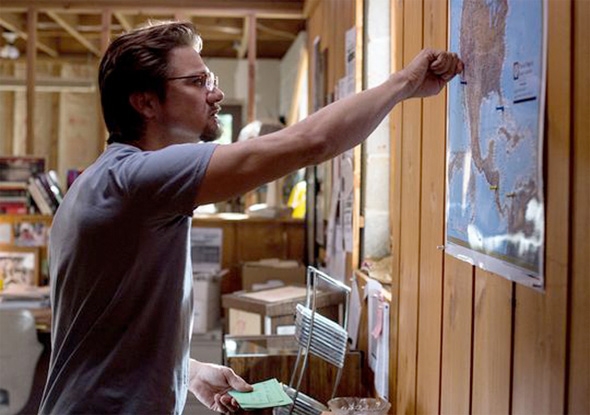Genre: Drama/Thriller
Premise: When a young woman is found dead in rural Wyoming, a wildlife serviceman who usually tracks mountain lions must team up with a young FBI agent to track a killer.
About: This is the new script from Sicario screenwriter, Taylor Sheridan, who will be making his directing debut with this, his third script. Avengers alums Jeremy Renner and Elizabeth Olsen play the leads. The project just finished shooting and is putting together an assembly cut.
Writer: Taylor Sheridan
Details: 112 pages
Someone made a point about Taylor Sheridan’s scripts when we were choosing loglines for the Scriptshadow 3 Month Script Challenge. The crux of his argument was: You’re forcing us to come up with these perfect loglines yet guys like Taylor Sheridan are breaking through with Sicario, a logline that doesn’t even sniff okaytion.
Point taken. So let’s figure out why Sheridan’s script still broke through. Ideally, as an unknown, you want an idea/logline that stands out. It’s the best way to get noticed. I will continue to shout to the rooftops that the way through Hollywood’s golden gates is a kickass logline.
Your next best shot is to write something with a unique voice, try to make the Black List, and sneak in through the back door. And that’s how Sheridan did it. His scripts are built on a unique voice, which I’ll touch on more after the summary.
But first, remember that these areas are not mutually exclusive. The ideal situation is that you come up with a great concept AND write with a unique voice. But absent one, make sure you have the other. Okay, now, what’s this “Wind River” about?
Cory Lambert is an agent for the United States Fish and Wildlife Service. If you’re anything like me, you didn’t know that existed. But up here in Wyoming, where the wildlife and the human life intermingle more than in your typical state, people like Cory make sure that the animals don’t cause too much trouble for their bipedal neighbors.
When Cory gets a call that an overzealous mountain lion is wreaking havoc in the northern woods, he goes to check it out, only to find a dead 18 year old girl instead. Both the local sheriff, a Native American man, and Jane Banner, a fresh off the assembly line FBI agent, come in to investigate.
What’s strange about this death is that snow tracks indicate the dead girl was running alone for miles. She should’ve died from weather exposure way sooner. And what exactly was she running from?
They first check out her boyfriend, a meth-addict, and it looks like this’ll be solved quickly. But it’s not clear that the boyfriend or his fucked up buddies have anything to do with this. As Cory and Jane begin to connect the dots, and find another dead man soon after, they realize that there may be a lot more going on here.
Complicating matters is that Cory lost his daughter at about the same age under similar circumstances. Could these deaths be related? And the big-city Jane isn’t helping things by purporting to know it all, despite being the least equipped to navigate the strange American/Indian inter-dynamics that go on in Wyoming. When all is said and done, the reluctant partners may be lucky if they don’t kill each other first.
As promised, I want to talk about “voice,” that elusive quality you keep hearing about on screenwriting sites, that is essential to screenwriting breakoutability, and how it applies to Wind River (and Sheridan’s scripts in particular).
The main component associated with voice is a unique sense of humor. Guys like Charlie Kaufman or Wes Anderson come to mind. The next biggest is point-of-view, or “how one sees the world.” Quentin Tarantino, for example, sees everything through the glasses of a 1970s Western with an Ennio Morricone soundtrack playing in the background.
But the way Sheridan displays voice is a little different. His voice is conveyed via a world that he knows about but we don’t. In this case, northern Wyoming, Indian Country, the kind of place where an aggressive mountain lion is more important than whether Kylie Jenner is still dating Tyga.
Because when you break “voice” down, it’s basically about being unique. Any way you can achieve uniqueness, the overall “voice” is going to sound different, and that’s exactly what Sheridan does.
This is why I keep reminding you guys, if you grew up somewhere other than New York, Los Angeles, or Paris, take advantage of that in your writing! The things that may seem common/mundane to you may very well be unknown/fascinating to us. If you can build a story around that, you have the potential to write something memorable.
Now there is some strategy to it. If you live out on a farm in the middle of nowhere and you want to write about the trials and tribulations of farming, readers probably won’t stick around. But if you write about a string of murders on a farm that takes place during a two year drought, you may have something.
So how did this factor into Wind River? Was it any good?
I’ll start by saying this. Sheridan is REALLY GOOD with character. When you read his stuff, the people feel real. That’s such an underrated skill. The large majority of characters in scripts feel written. Sheridan’s mastered the art of simple interactions that say a lot (a look between a man and woman who used to be married, for example). It’s rare that characters feel so consistently genuine.
Here’s where things got tricky though. In each of Sheridan’s scripts, they always start strong, then somewhere around the midpoint, they lose steam or lose focus or lose something. It’s hard to define. But I’ll notice around page 65 that I’m not as invested as I was 20 pages ago. And I don’t know why.
One of the things I’ve noticed with these dramatic (and therefore slower) thrillers is that they can get away from you if you’re not careful. If you don’t stay on the plot and keep things interesting, they can get boring FAST. I almost feel like they need more jolts, more twists or turns to keep us on our toes. Because what you don’t want is it to turn into a straightforward been-there-done-that investigation flick. SO MANY of these slow thrillers end up there. And Wind River did start to feel that way (at least for awhile).
With that said, there’s still a lot to like. One of my favorite moments was the introduction of Jane. We’d been watching Cory navigate the land by deer poop and tree branches, and then Jane pulls up in her SUV, and her GPS is telling her to take a right, but there is no right because the road has been covered up by snow, so she literally has no idea what to do. If the GPS can’t tell her where to go, she doesn’t know where to go.
I LOVE when writers do a good job setting up the contrast between major characters and most of that is done through introductions. I just found this to be the perfect way to show that this woman lived in a completely different world than these men.
Another thing I like about Sheridan is how SPECIFIC he gets. This is a big way to set your script apart. So, for instance, when Cory explains to Jane the difficulties in gauging how long someone can last out in the cold, he delivers this line:
I seen tourists freeze to death in these mountains when it was barely 40 degrees … I seen a fur trader caught in his own trap, drag himself six miles to a forest service cabin and radio for help. In the dead of winter … There ain’t no gauge for the will to live. Some have it. Plenty don’t.
I mean who thinks up a fur trader getting trapped in his own trap and then draggig himself six miles other than someone who lives in this world? This may seem like a small thing but it’s specificity like this that separates your script from all the generic garbage that’s written every day. I’ve read hundreds of similar scripts and the majority of the time, I’ll get a line closer to this:
I’ve seen people make it 10 miles in a t-shirt and 2 miles in full-on ski gear. It’s all about the will to live.
That line indicates a writer who knows ZIP about northern Wyoming in the middle of January.
All in all, Wind River is good. It slogs some in its second act. But the setup is great, the setting is unique, the characters feel honest and are easy to root for, and the overall voice is stellar. If you’re afraid of the high-concept world and want to break in on voice alone, Sheridan’s scripts are good scripts to study.
[ ] What the hell did I just read?
[ ] wasn’t for me
[x] worth the read
[ ] impressive
[ ] genius
What I learned: A storm coming in is an easy way to bring excitement to a slower story. Remember that you’re competing with 300 million dollar comic book films where every frame is designed to blow your brain up. You want to look for any trick you can to add excitement to your much smaller story. The indication that a storm is coming adds TENSION, SUSPENSE, and A TICKING TIME BOMB, all things that beef a story up. Fight capes with good storytelling, guys. :)



